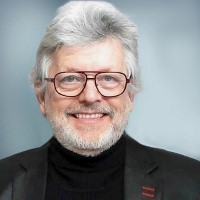Project Business Management
SERIES ARTICLE
By Oliver F. Lehmann
Munich, Germany
“Selfish and contentious people will not cohere, and without coherence nothing can be effected.”
– Charles Darwin [1]

Summary
Projects performed under contract form complex ecosystems in which companies compete and cooperate simultaneously. This article explores how Project Business mirrors biological systems – from the interdependence of cells and mitochondria to the balance of predators, parasites, and symbionts. It links conflict-causing factors, such as divergent interests and incompatible organizations, to systemic behavior in project networks. By viewing projects as living ecosystems rather than zero-sum transactions, professionals can foster trust, resilience, and shared success across corporate boundaries — sustaining both business and collaboration in the global Project Economy.
Definitions [2]
Ecosystem:
- All the living things in an area and the way they affect each other and the environment
- Any complicated system consisting of many different people, processes, activities, etc., especially relating to technology, and the way that they affect each other
- All the plants, animals, and people living in an area considered together with their environment as a system of relationships
- A group of businesses or business activities that affect each other and work well together
Figure 1: A Project Business ecosystem is a living network of independent, interdependent actors and flows of money and results.
A Story from the Field
The project began with great expectations.
MetalForm GmbH [3], a respected German automotive supplier, had just won a prestigious contract to design and deliver lightweight battery enclosures for a new electric-vehicle platform. The customer – a global car manufacturer – trusted MetalForm’s engineering expertise and innovative approach.
But what started as a triumph slowly turned into a case study of failure.
At the first joint meeting, MetalForm’s managers radiated confidence – and control. Their goal, they said, was clear: maximize profit and keep the customer “in check.” Each negotiation became a tug-of-war. Every design change was treated as a revenue opportunity. When a subcontractor fell behind schedule, MetalForm’s purchasing department imposed penalties rather than seeking solutions.
More…
To read entire article, click here
Editor’s note: This series of articles is by Oliver Lehmann, author of the book “Project Business Management” (ISBN 9781138197503), published by Auerbach / Taylor & Francis in 2018. See author profile below.
How to cite this article: Lehmann, O. F. (2025). Ecosystems in Project Business, series article, PM World Journal, Vol. XIV, Issue XI, November. Available online at https://pmworldlibrary.net/wp-content/uploads/2025/11/pmwj158-Nov2025-Lehmann-Ecosystems-in-Project-Business.pdf
About the Author

Oliver F. Lehmann
Munich, Germany
![]()
Oliver F. Lehmann, MSc, ACE, PMP, is a project management educator, author, consultant, and speaker. In addition, he is the owner of the website Project Business Foundation, a non-profit initiative for professionals and organizations involved in cross-corporate project business.
He studied Linguistics, Literature, and History at the University of Stuttgart and Project Management at the University of Liverpool, UK, where he holds a Master of Science Degree (with Merit). Oliver has trained thousands of project managers in Europe, the USA, and Asia in methodological project management, focusing on certification preparation. In addition, he is a visiting lecturer at the Technical University of Munich.
He has been a member and volunteer at PMI, the Project Management Institute, since 1998 and served as the President of the PMI Southern Germany Chapter from 2013 to 2018. Between 2004 and 2006, he contributed to PMI’s PM Network magazine, for which he provided a monthly editorial on page 1 called “Launch,” analyzing troubled projects around the world.
Oliver believes in three driving forces for personal improvement in project management: formal learning, experience, and observations. He resides in Munich, Bavaria, Germany, and can be contacted at oliver@oliverlehmann.com.
Oliver Lehmann is the author of the books:
- “Situational Project Management: The Dynamics of Success and Failure” (ISBN 9781498722612), published by Auerbach / Taylor & Francis in 2016
- “Project Business Management” (ISBN 9781138197503), published by Auerbach / Taylor & Francis in 2018.
His previous articles and papers for PM World Journal can be found here:
[1] (Darwin, 1871)
[2] (Cambridge Dictionary, n.a.)
[3] Names changed









